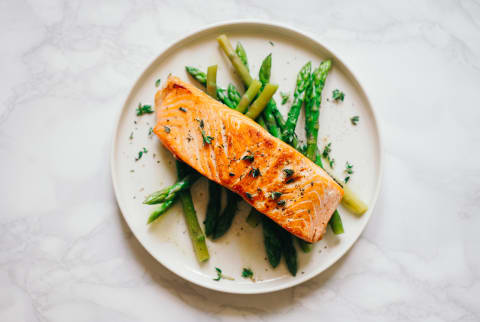Eating Fish This Often Could Protect Your Brain From The Effects Of Air Pollution, Study Says


When it comes to eating for brain health, there are plenty of foods that support brainpower—but can our diet help protect our brains from external threats like pollution?
A new study, published yesterday, found that eating broiled or baked fish just once or twice a week may help protect the brain from the negative impacts of air pollution, thanks to the powers of omega-3 fatty acids.
Advertisement
The omega-3–brain connection.
Omega-3 fatty acids are a type of polyunsaturated fat that are deemed an "essential fat" because we cannot produce enough without eating it as well—and fish are a popular source for many diets.
"Fish are an excellent source of omega-3 fatty acids and easy to add to the diet," says study author Ka He, M.D., Sc.D., of Columbia University in New York. "Omega-3 fatty acids have been shown to fight inflammation and maintain brain structure in aging brains. They have also been found to reduce brain damage caused by neurotoxins like lead and mercury."
The new research, published in Neurology, the medical journal of the American Academy of Neurology, set out to see if those benefits extended to other forms of toxins: "We explored if omega-3 fatty acids have a protective effect against another neurotoxin, the fine particulate matter found in air pollution," says He.
Using a combination of blood tests, diet questionnaires, and brain scans, researchers were able to see that women who had the highest blood omega-3 levels had greater volumes of white matter and greater volumes of the hippocampus.
The study included older women (the average age of participants was 70) who lived in areas with high levels of air pollution and did not have dementia at the start of the study. The researchers assessed the amount of fish (including broiled or baked fish, canned tuna, tuna salad, tuna casserole, and non-fried shellfish) the participants consumed.
"Our findings suggest that higher levels of omega-3 fatty acids in the blood from fish consumption may preserve brain volume as women age and possibly protect against the potential toxic effects of air pollution," concludes He. "It's important to note that our study only found an association between brain volume and eating fish. It does not prove that eating fish preserves brain volume."
How to incorporate fish into your diet.
The study specifically called out eating fish that has been broiled or baked as being linked to brain health benefits, but there's also one preparation that's likely to negate any of those omega-3s: frying the fish, as this has been shown to damage the fatty acids.
While you're thinking about whether you bake or broil your fish for dinner, it's also worth thinking about what kind of fish you'll be eating. Mark Hyman, M.D., is a fan of the SMASH method for picking fish. "You want to stay away from the big fish," he says. SMASH is a convenient device for knowing which fish he'd pick: salmon, mackerel, anchovies, herring, and sardines.
Need some inspo? These 15 pescatarian recipes are a good place to start.
Advertisement

Eliza Sullivan is an SEO Editor at mindbodygreen, where she writes about food, recipes, and nutrition—among other things. She received a B.S. in journalism and B.A. in english literature with honors from Boston University, and she has previously written for Boston Magazine, TheTaste.ie, and SUITCASE magazine.